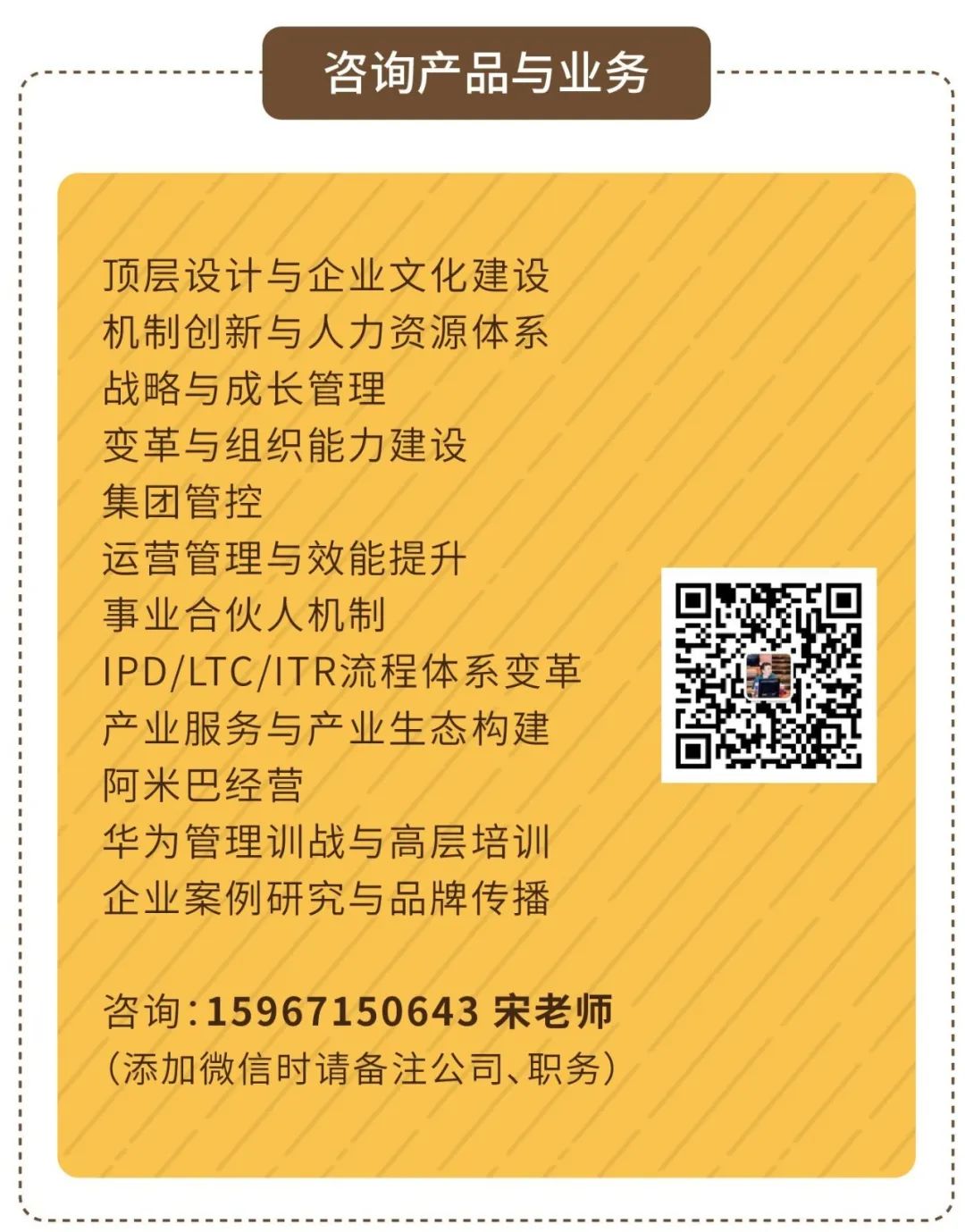
-
Source: Electronic Engineering Magazine (ID: eet-china)
-
The article represents the author’s personal views only
 Why is Israel called the “Chip Kingdom”? As a small country with a land area smaller than that of Beijing and Tianjin combined, Israel has a population of less than 9.4 million (data from the World Bank as of 2021), is constantly at war, lacks oil and fresh water, and is so resource-poor that it has nothing but sand. However, from the outside, Israel is seen as a technologically advanced country with a strong military force. It accounts for only 0.2% of the global population but has won 20% of the Nobel Prizes, ranks second in the global innovation index, and has a per capita GDP of over $40,000, making it a veritable “Chip Kingdom”.
Why is Israel called the “Chip Kingdom”? As a small country with a land area smaller than that of Beijing and Tianjin combined, Israel has a population of less than 9.4 million (data from the World Bank as of 2021), is constantly at war, lacks oil and fresh water, and is so resource-poor that it has nothing but sand. However, from the outside, Israel is seen as a technologically advanced country with a strong military force. It accounts for only 0.2% of the global population but has won 20% of the Nobel Prizes, ranks second in the global innovation index, and has a per capita GDP of over $40,000, making it a veritable “Chip Kingdom”.
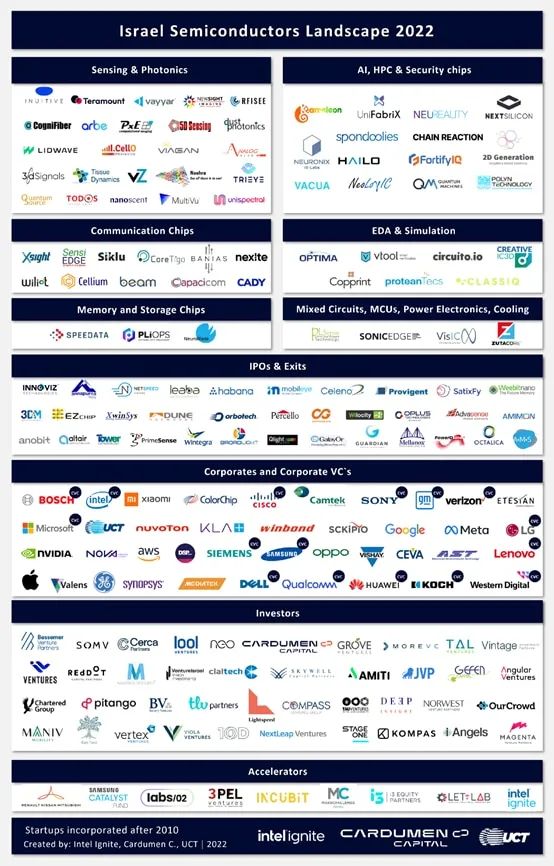
Israel’s semiconductor landscape in 2022. Source: Intel Ignite Cardumen C. UCT Israel’s semiconductor industry has a development history of over 40 years and is one of the countries with the most complete semiconductor industry ecosystems in the world. The world’s first handheld mobile phone, the first computer processor, SanDisk’s first USB flash drive, and Intel’s first mobile chip were all born here. Since Intel established its first R&D center in Israel in 1974, Israel has played an increasingly important role in the global semiconductor industry. The head of this R&D center was an Israeli named Dov Frohman, who was born in Amsterdam just before World War II. His parents were killed in the Nazi genocide against the Jews, and Frohman was hidden by a Belgian farmer until he was discovered by a distant relative in Israel after the war.
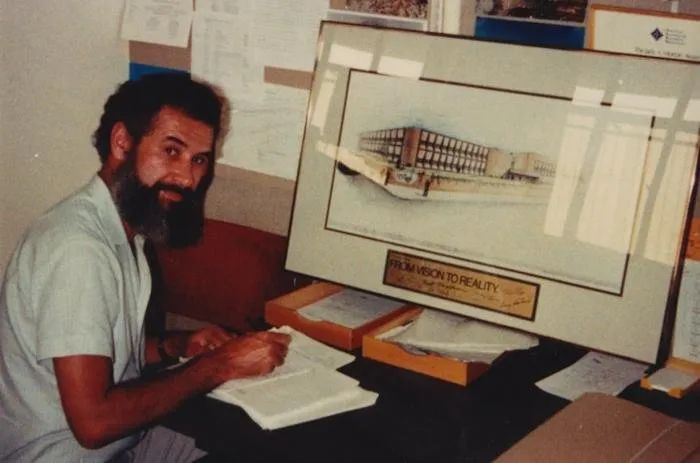
Dov Frohman in 1976 After serving in the military, Frohman entered the Technion, known as the “MIT of the Middle East,” and then went to the U.S. for his master’s degree. After graduating, he joined the renowned Fairchild Semiconductor. In 1969, Frohman obtained his Ph.D. and joined Intel, founded a year earlier by the three giants Gordon Moore, Robert Noyce, and Andrew Grove. During his over 30 years at Intel, Frohman’s greatest contribution was the invention of EPROM. In 1974, having achieved great success, Frohman decided to return to his homeland to build it and persuaded Intel to establish a research center in Israel, marking the origin of Israel’s semiconductor industry. Israelis are very proud of this; local entrepreneur Jon Medved once joked that Intel should change its slogan from “Intel Inside” to “Israel Inside”. Similarly, when Apple designed its first mobile processor A4, it recruited Johny Srouji, an Israeli who had worked at Intel for over ten years. Like Frohman, Johny Srouji graduated from the Technion and quickly became the top figure in Apple’s chip department, leading the chip R&D center in Tel Aviv, and was referred to by Bloomberg as “the most important Apple executive you’ve never heard of”. According to data from the Israeli Venture Capital Research Center (IVC), as of January 2018, Israel had 163 chip companies, 35 R&D centers, 67 companies in the initial revenue stage, 30 chip design companies, 20 semiconductor equipment companies, 10 optical communication companies, and 8 wafer fabs. Almost all leading global semiconductor companies, including Intel, Qualcomm, Samsung, and Broadcom, have set up camp here. In the increasingly competitive semiconductor industry, Israel has a large number of excellent chip companies being sought after for acquisition by international semiconductor giants, along with a growing number of emerging chip startups attracting the attention of more and more international investors, including those from China. It is hard to imagine that on this land, which covers only 15,000 square kilometers, more than 160 chip companies have emerged; it is equally hard to imagine what impact a war would have on Israel and the global semiconductor industry. Now, let’s take a look at the chip companies that have emerged from Israel.
01
Chip Companies in Israel If we analyze Israel’s semiconductor market closely, memory chips occupy the largest share, followed by power management ICs, logic chips, OSD (On Screen Display), and analog chips.
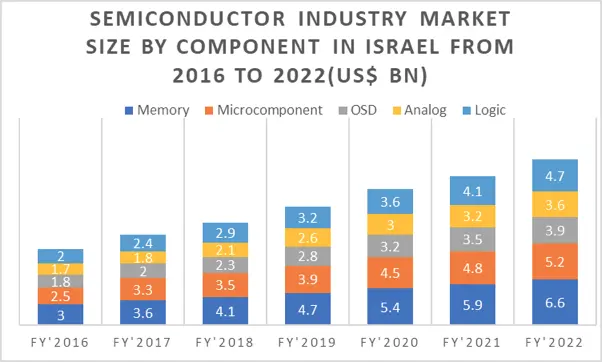
Source: reogma However, with the wave of AI sweeping the globe, AI chips have quickly become one of the hottest focuses. As a leading chip nation, Israel has also seen the emergence of many AI chip companies in recent years. According to market segmentation, Israel’s largest semiconductor market is data processing, followed by communications, industrial, consumer electronics, and autonomous driving.
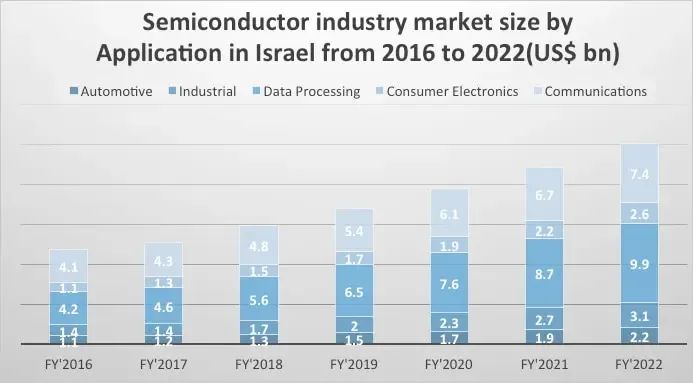
Source: reogma1. Hailo Technologies Israeli startup Hailo Technologies was founded in 2017, and in May of this year, the company launched its first processor designed specifically for deep learning applications in end devices, supporting autonomous vehicles, smart cameras, smartphones, drones, and VR/AR devices. Unlike processors used in data centers, the most important features of this chip are low power consumption, small physical size, low cost, and high operational flexibility. The first batch of samples is about to be delivered to major manufacturers and suppliers in the automotive and camera industries for performance testing. In 2018, Hailo Technologies raised $12.5 million in Series A funding and completed $60 million in Series B funding in 2020.2. Inuitive Israeli semiconductor startup Inuitive was founded in 2012 and is a manufacturer of advanced 3D computer vision and image processors. Utilizing the licensed CEVA-XM4 smart vision DSP, it runs complex real-time depth sensing, feature tracking, object recognition, deep learning, and other vision-related algorithms targeting various mobile devices. Its products, NU3000/NU4000, are ASIC chips that support 3D image processing and computer vision (CV) processing. It is said that Inuitive is the first and only company to provide dedicated and complete 3D image processing and CV co-processors. In 2017, Inuitive reached a cooperation agreement with SoftBank Corp., a subsidiary of Japan’s SoftBank Group, which will use the chips developed by this startup in its future IoT (Internet of Things) projects. In addition to SoftBank, Inuitive has also collaborated with Baidu and Tencent in robotics and has established a team in Shenzhen for customer support. In 2022, Inuitive launched the NU4100, expanding its edge AI chip product portfolio.3. Vayyar Imaging Vayyar is a 3D sensor company founded in 2011, with three co-founders who have strong backgrounds, having held key positions in high-tech companies like Intel and possessing 20 to 30 years of R&D experience in their respective fields. Two of the founders were also entrusted with important roles in the Israel Defense Forces. As a global leader in 3D imaging technology, Vayyar not only provides sensors for applications such as breast cancer screening, leak detection, and safety monitoring but also develops system-on-chip (SoC) solutions for millimeter-wave 3D imaging. Its chips cover imaging and radar frequency bands from 3GHz to 81GHz, with a single chip containing 72 transmitters and receivers. On December 28, 2017, Vayyar Imaging announced a close collaboration with SoftBank Corp. in the IoT field, with SoftBank becoming the preferred channel partner for Vayyar products in the Japanese market, stating that Vayyar’s sensor technology has significant synergy with SoftBank’s customer needs. In 2022, Geely’s parent company, Geely Holding Group’s GLy New Mobility Fund, announced that it had completed an investment in Vayyar Imaging, with this round of financing involving $108 million.4. NeuroBlade NeuroBlade was founded in 2017 and develops processors for AI applications called SPU (SQL Processing Unit), which can be used for autonomous vehicles, video analysis, and image recognition. The company’s goal is to become the “Nvidia of data analytics.” NeuroBlade SPU is primarily used to accelerate SQL instruction processing. The company’s CEO stated that by using specially designed processors to accelerate SQL processing, end-to-end SQL analysis acceleration can be achieved. In terms of deployment, the chip is inserted via the PCIe bus of the host server, transparently taking over SQL-related processing without requiring modifications to the host application software.5. NeuReality NeuReality was founded in 2019 and is headquartered in Israel, positioning itself as a disruptor in deep learning and AI solution architecture. The company has redefined AI-centric inference architecture and developed accompanying NAPU (Network Addressable Processing Units) chips to replace traditional CPU-centric AI inference solutions. Compared to existing technologies, NeuReality’s solutions are designed for optimized deployment in data centers and near-edge local locations that require higher performance, lower latency, and greater efficiency, with wide applications in public safety, e-commerce, social networking, healthcare, and more.
02
Strong Chip Companies in IsraelTowerjazz Towerjazz (Tower Semiconductor) is a global leader in specialty process wafer foundry, formed by the merger of Tower Semiconductor and Jazz Semiconductor. Towerjazz produces chips for smartphones, chargers, direct AC adapters, and image sensors. Towerjazz’s clients span automotive, medical, industrial, consumer, aerospace, and defense sectors. In recent years, Towerjazz has achieved record performance growth while driving customer success and will continue to pursue excellence in technology and quality, maintaining a strong growth outlook. In 2022, Intel planned to acquire Tower, but announced the termination of this acquisition in August 2023 due to the inability to obtain timely approval from (Chinese) regulatory authorities.Sckipio Sckipio, founded in 2012 and headquartered in Ramat Gan, Israel, primarily develops modems and broadband application chips for G.fast Modem. In 2014, Sckipio launched the world’s first G.fast modem chipset, which can provide broadband speeds of up to 2Gbps over existing copper lines, offering “last mile” wireless broadband access to home users. This fundamentally changed how telecom service providers deliver 1Gbps ultra-broadband internet access to bandwidth-demanding users at the lowest cost. It is reported that over 20% of the G.fast standard comes from Sckipio technology. Sckipio has ranked first in Israel’s emerging technology company rankings and can be considered a global leader in the G.fast field.Xsight Labs Xsight Labs LTD was founded in 2017 and is headquartered in Kiryat Gat, Israel. It is a startup manufacturing chipsets for the semiconductor field in the data center and automotive industry. The company is dedicated to accelerating the next generation of cloud-based data-intensive workloads, such as machine learning, data analytics, and disaggregated storage. In this data-centric era, where bandwidth is growing exponentially, Xsight provides a new chipset design that enhances scalability, performance, and efficiency.
03
Israeli Chip Companies Acquired The strength of Israel’s chips is also reflected in the fact that many Israeli chip companies with outstanding innovative thinking and R&D capabilities have been acquired by tech giants both domestically and internationally. According to research from OurCrowd, a well-known equity crowdfunding platform in Israel, over 70% of Israeli chip-related companies successfully achieved IPOs or were acquired after reaching revenues of one million dollars in the past decade.1. Mellanox Mellanox Technologies was founded in 1999 and is headquartered in Yokneam, Israel, with an office in the United States. The company primarily focuses on data center server chips and is a leading supplier of end-to-end connectivity solutions for servers and storage. Mellanox specializes in producing chips for high-speed Ethernet and InfiniBand connections for servers. In March 2019, Nvidia officially announced its acquisition of Mellanox for up to $6.9 billion, which was Nvidia’s largest acquisition at the time. With the support of Mellanox, Nvidia is also expected to achieve greater development in the server market (which accounts for about one-third of Nvidia’s business).2. Habana Labs Habana Labs is a fabless semiconductor company located in Tel Aviv, Israel, and San Jose, California. Founded in 2016, the company specializes in using artificial intelligence to enhance chip processing performance while reducing chip costs and power consumption. It focuses on developing AI processors optimized for the specific needs of deep training neural networks and inference deployment in production environments. Among all AI semiconductor startups, Habana Labs is the first and only company to launch production-ready AI processors. On December 16, 2019, Intel officially announced its acquisition of Habana Labs for $2 billion. This was Intel’s third acquisition of a large AI startup, following the $15.3 billion acquisition of Mobileye and the $350 million acquisition of Nervana.3. ColorChip ColorChip was founded in 2001 and is headquartered in Yokneam, northern Israel. The company primarily designs and manufactures communication components for telecom suppliers and data centers. ColorChip mainly develops hybrid integrated technology known as SystemOnGlass, using glass material wafers to create optical devices, thus bringing semiconductor manufacturing technology into the optical communication field. ColorChip has its own fab in Israel and produces various devices there. Its business mainly includes passive PLC splitter product lines for the FTTx market and transceiver product lines for high-speed networks. Facebook is one of ColorChip’s clients. In 2018, Chinese chip design company Sanan Optoelectronics acquired ColorChip for $300 million, which will further strengthen its R&D efforts in integrated circuits, especially in the communication chip field.4. Mobileye Mobileye is an Israeli company that produces visual systems to assist drivers in ensuring passenger safety and reducing traffic accidents. Founded in 1999, the company is a world leader in the development of monocular vision advanced driver assistance systems (ADAS), providing chip-mounted systems and computer vision algorithms for DAS client functions, and is a supplier of advanced driver assistance systems (ADAS) and autonomous driving technology for 27 major automotive manufacturers, including BMW, Audi, Tesla, Volvo, and Ford. On March 13, 2017, Intel announced its acquisition of Mobileye for $15.3 billion, making it the largest acquisition of a high-tech company in Israel.5. Orbotech Orbotech is a technology company located in Yavne, Israel, founded in 1981. After more than 30 years of development, Orbotech has become a global leader in advanced precision manufacturing solutions. Without their machines, companies like Apple, Samsung, and LG would be unable to produce chips and develop new devices. In March 2018, American semiconductor company KLA-Tencor acquired Orbotech for $3.4 billion, hoping to gain new opportunities in high-growth markets such as printed circuit boards, flat panel displays, semiconductor manufacturing, and packaging through this acquisition.6. Toga Networks Toga Networks, located in Hod Hasharon, Israel, was founded in 2009 and provides advanced technology research and high-level design for the IT and telecom markets. It has designed and developed a series of products for the telecom industry, including switches and routers, while also expanding its business scope to cloud storage systems and data center applications. In December 2016, Huawei acquired Toga Networks, with both parties keeping the commercial terms of the transaction confidential. Huawei did not provide further details.7. Rocketick Cadence acquired the Israeli chip startup Rocketick for $40 million in April 2016. Cadence’s parallel simulation platform Xcelium, based on multi-core parallel computing technology, was brought about by Rocketick’s technology.8. Wilocity Wilocity was founded in 2007 and is a fabless chip manufacturer in Israel, primarily developing WiGig chips. WiGig is a new wireless transmission technology standard that uses 60GHz transmission technology to achieve wireless transmission speeds of up to 7Gbps over short distances of 10 to 20 meters. In July 2014, Qualcomm announced its acquisition of Wilocity for $300 million.9. Annapurna Labs Annapurna Labs is a chip manufacturer founded in 2011 in Israel, primarily developing microprocessors that enable low-power computing servers and storage servers to run data quickly. Annapurna Labs is one of the outstanding startup chip manufacturers that have grown in Israel over the past decade. In January 2015, it was acquired by Amazon.10. PrimeSense PrimeSense was founded in 2005 and is an Israeli company that has revolutionized how digital devices perceive and understand the world. In November 2013, it was acquired by Apple for $345 million. PrimeSense’s technology is now used in “3D touch,” and it is speculated that this technology will also be used in Apple TV.11. BroadLight BroadLight, an Israeli chip developer, was established in 2000 and is a leading supplier of highly integrated network and embedded processors, providing fiber-quality service delivery for exchange and client devices. It mainly provides semiconductors and software for fiber communication networks, with cumulative financing of $55 million before acquisition. In March 2012, Broadcom announced its acquisition of BroadLight for $195 million. Additionally, Broadcom had previously acquired another Israeli chip developer, Provigent, for $313 million in April 2011.12. Autotalks Autotalks was founded in 2008 and is a fabless semiconductor company dedicated to providing vehicle-to-everything (V2X) communication for both manned and autonomous vehicles. It is a private company, and Autotalks’ first and second-generation chipsets offer the highest performance and reliability, deployed in numerous exciting connected and autonomous driving projects driven by global OEMs and Tier 1 suppliers. Autotalks is the only company providing a global V2X solution compatible with any V2X technology while adhering to the strictest automotive safety, functional safety, and reliability requirements. In May 2023, to accelerate the development and adoption of V2X solutions, Qualcomm announced that its subsidiary, Qualcomm Technologies, had reached a final acquisition agreement with Autotalks.
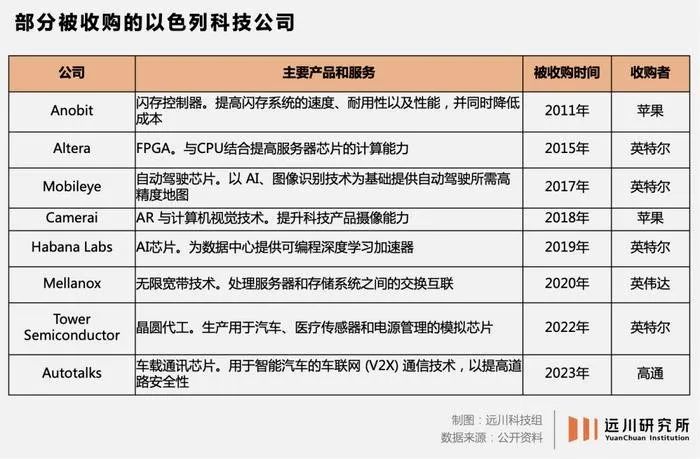
Source: Yuan Chuan Research Institute In addition to the Israeli chip companies mentioned above that have been acquired, there are countless such cases. In August 2015, ARM acquired Sansa Security; in March 2016, Cisco acquired Leaba; in January 2016, Sony acquired Altair Semiconductor; in January 2015, Amazon acquired Annapurna; in July 2014, Qualcomm acquired Wilocity; in December 2011, Apple spent about $400-500 million to acquire the Israeli flash design company Anobit; in November 2007, Samsung announced the acquisition of the Israeli chip design company TransChip for $70 million; and Marvell spent $2.7 billion to acquire the LAN chip provider Galileo Technology in 2000, among others. Most of the acquired companies share similar characteristics: strong technical capabilities but almost no sales and operational capabilities, and often lack mature products. Anobit, acquired by Apple in 2011, is a typical example. Similar stories abound; Israeli companies often gamble on cutting-edge technology fields such as AI and autonomous driving, and then seek safe exits once the technology matures, making Israel a hotspot for venture capital. According to statistics, one-third of Israeli companies exit through IPOs, while two-thirds exit through acquisitions, with most being acquired by American companies. These entrepreneurs then start their nth round of startups, and because of this, hundreds of Israeli semiconductor startups focus more on refining technology rather than on business and operations.
Special Contribution: Limited Edition Collection
8-piece limited edition assembled gift box

↑ Click the image link to view details
